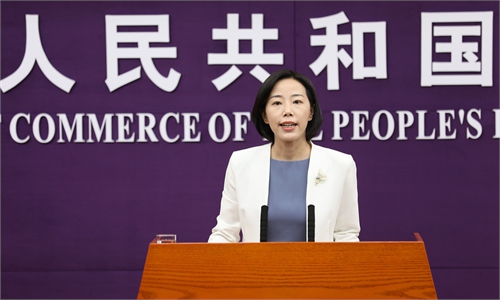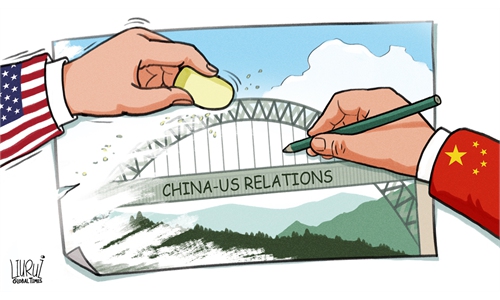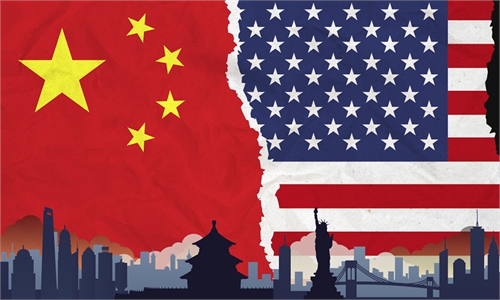
Illustration: Chen Xia/Global Times
It is true that for two heavyweight economies like the US and China, turning their backs on each other should never be an option, and for the sake of sustaining peace and nurturing world growth and prosperity, the two countries ought to establish pragmatic and down-to-earth terms and avoid viewing each other as strategic rivals or adversaries.
The recent summit between the top leaders of both countries in San Francisco should provide a strong foundation for action by both nations. By all metrics, this important bilateral summit reassured the global business community and helped restore confidence in investors. As a result, both Wall Street and Chinese stocks have rallied, albeit to varying degrees.
For a protracted period, the world has been hearing the sensational narrative initiated and trumpeted by a few anti-China politicians in the West who call for "decoupling" or "de-risking" from China, which reflects their ill-intentioned geopolitical game aimed at restricting China's access to technology and investment, and strangling Chinese people's rise on the global stage.
It is of great importance for the two countries' leaderships to strongly oppose trade and economic disintegration or "decoupling," as such actions run counter to global development trends and will lead to a pullback in productivity and public welfare. China and the US need to find the right path to get along with each other, even if they can't form a close political relationship due to their different political and social systems.
For Beijing and Washington, maintaining a pragmatic and non-confrontational working relationship is significant and crucial for regional and global economic development. In the Asia-Pacific region, which represents a substantial 62 percent of global GDP and nearly half of global trade, the US and China, the two largest economies, are able to create plenty of commerce and investment opportunities for all regional economies if they choose to cooperate on pragmatic terms. The dynamics of regional and global economic growth is tethered to the two juggernauts.
The world's economy is recovering from the pandemic, but its momentum remains largely sluggish, as industry and supply chains still face the threat of man-made interruptions. Additionally, trade and investment protectionism has raised its ugly head in some countries.
It is imperative for China and the US to maintain normal communications, engage in practical, business-like dialogue on all topics of mutual concern, resolve their problems through consultation and refrain from antagonizing each other. Pointing fingers at each other is easy but won't help resolve any problems.
It is unrealistic for one nation to remodel or change the other, and conflict and confrontation will have unbearable and disastrous consequences for both countries and the world. The US presidential election is scheduled for November 2024, yet at this time the two political parties in the US are accustomed to using "harsh and hard-line language" against China. So it is important for the two countries to manage their relationship to guard against a free fall.
The consensuses reached between China and the US during the San Francisco summit meeting signal that the two countries are, in large part, committed to resolving their differences through earnest discussions and are open to doing business on pragmatic terms. This new mutual understanding should lead to massive opportunities for both Chinese and American businesses and investors, benefiting other economies as well.
In late September, Beijing and Washington reached an agreement to set up two working groups to discuss specific China-US economic and financial issues, which was widely regarded as a tentative sign that bilateral communication is improving. The new format for conducting regular talks follows years of roiling economic conflict between the two sides over trade restrictions.
It is significant for the two countries to hold face-to-face dialogues and exchange information on macroeconomic policies and financial developments. Notably, China and the US have been successful in forming a robust trade relationship, with last year's bilateral trade exceeding $750 billion. However, in the past few years, Washington has arbitrarily broadened trade restrictions and technology suppression against China under the guise of national and economic security, which has severely damaged bilateral ties.
For years, imports of inexpensive and high-quality Chinese goods have greatly benefited US households and companies, helping to control stubborn inflation in the US. For the two countries to build on their mutually beneficial commerce, now it is time to get back to the business of making money by removing the Trump-era punitive tariffs, avoiding further tit-for-tat retaliatory actions, and stopping the politicization and weaponization of trade and technology.
During the summit, the two countries agreed to address some key issues including global climate change and artificial intelligence (AI). They also agreed to restart military-to-military talks, which will contribute to regional and global stability.
Climate change and the evolving trend of AI innovation affect the world's sustainable development and humankind's very survival. Global warming is not abating, while many scientists are worried that unregulated AI innovation could lead to adverse outcomes. These issues won't be resolved without collaboration between Beijing and Washington.
In the first 10 months of this year, bilateral trade dropped, largely due to the high tariffs and the strong headwinds the global economy is facing. But the two countries still remain significant trading partners with a strong interdependence. Now, their focus should shift toward harnessing cooperation, conferring on economic and financial policy, and fostering healthy competition instead of cutthroat dueling.
Following the summit, it is crucial to translate the leaders' consensuses into comprehensive and actionable policies, backed up with concrete steps, to reconstruct a pragmatic and mutually reinforcing economic relationship. It would be in the best interests of both nations to take positive moves toward increasing cooperation in all areas of mutual interest, such as environmental protection, digital data security, high-tech standardization, the evolution of AI, and overall regional and global stability.
The author is an editor with the Global Times. bizopinion@globaltimes.com.cn



